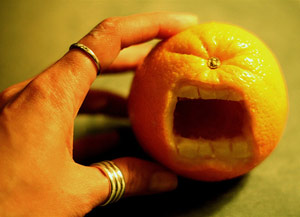在英语中,it是一个常用的代词,用于指代事或物,相当于汉语的“它”。不过,由于中西方语言的差异,在英汉互译的过程中往往不能直译为“它”。如It's a desk. 应译为“这是(一张)书桌” ,而不是“它是(一张)桌子”。
其实,it看似简单,但有时由于所指不明确,会造成翻译上的困难。比如,Can you dig it?意思并不是问“你能将它挖出来吗?”这里,it并不指任何具体的事物,而是泛泛地指“情况”。因此,这句话的正确意思是“你弄明白了吗?”
又如I can't help it.的意思是“我也无能为力/我也没辙”,其中的it也指情形/局面或事态的发展。
有时侯,我们可以将it看成是习语的一部分,比如:
blow it: 出错
buy it: 愿听某人说(买东西时一般说:I'll take it/this one)
catch it: 挨骂或受罚
(be) at it: 忙于做某事
flush it: 弄砸
wing it: 毫无准备地做某事
call it a day:(一天的工作)到此为止
Easy does it: 小心/谨慎从事
在it的众多用法中,还有一种用法被称之为“假宾语(sham object,包括介词宾语)”。比如“Cool it”是叫人“悠着点”;“Bottle it!”是让人“闭嘴”;“Beat it!”是叫人“滚蛋!”。下面一些句子均含有“假宾语”的结构:
They finally legged it back to the school.
他们最后还是选择步行回到了学校。
We must brave it out no matter what they say.
不管他们说什么,我们都得坚持下去。
He then clerked it in a local bank.
后来他只好在当地一家银行当职员。
You must make a go of it.
你们一定要干得漂亮点。
They really hit it well with the natives.
他们和当地人确实相处得很好。
He reached the railway station just one minute before the train was due to leave. He cut it too fine.
他在火车临开前一分钟才赶到车站,时间压得太紧了。
I gave it to him hot and strong.
我让他吃不了兜着走。
He decided to bach it all his life.
他决定打一辈子光棍。
The Bloom family of four adults and five children pigged it in the two rooms.
布鲁姆一家有四个大人,五个孩子,他们挤着住在两个房间里。
You'll live to rue it.
你总有一天要后悔的。
Will football make it in the country that calls it soccer?
在足球被称为soccer的国家,足球能流行起来吗?
此外,英语中一些骂人的粗话也常使用it,如Hang it!,Confound it!,Damn it!,Cram it! 相当于汉语的“该死”“讨厌”“见鬼”之类的意思。(注意慎用)
相关阅读
(来源:21世纪英语 作者:陈德彰 编辑:崔旭燕)